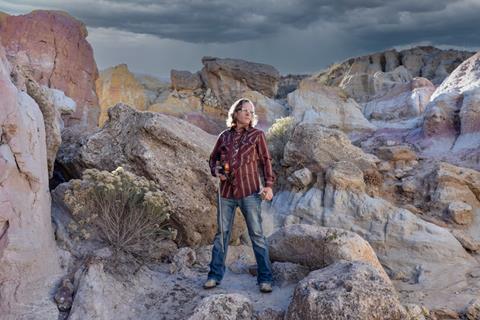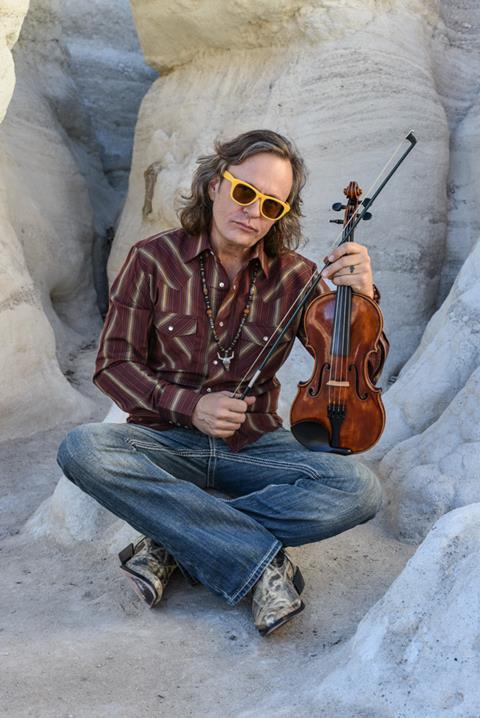A raw and reflective solo set from Infamous Stringdusters fiddler Jeremy Garrett, Storm Mountain channels off-grid living into bluegrass with bite, soul and cosmic curiosity.

Discover more Featured Stories like this in The Strad Playing Hub
With his new solo album Storm Mountain, the innovative, Grammy-winning fiddle player, singer and songwriter Jeremy Garrett — best known as a founding member of The Infamous Stringdusters, a progressive bluegrass band that has pioneered a ‘jamgrass’ sound — channels the rugged solitude of his off-the-grid life in the Colorado mountains into a strikingly personal and stylistically wide-ranging bluegrass collection.
Recorded largely in his one-room studio near the remote town of Drake, Storm Mountain draws on the extremes of mountain living: its freedom and stillness, but also its unforgiving wildness.
From reflections on parenthood and quantum physics to tributes to Larry Sparks and encounters with UFOs, the album speaks to both the elemental and emotional extremes of living off the grid. Garrett spoke about lonesome music, soulful covers and how solitude fuels his sound.
Storm Mountain feels both personal and elemental. What sparked the decision to make an album inspired by your off-the-grid life in Colorado?
Jeremy Garrett: Living off grid and in the mountains can bring unexpected challenges at times. It could be a wildlife issue, many different kinds of storms, including deep snow, ice, rain, hail, tremendous wind. It’s moody, I guess – kind of like life. It was definitely a metaphor that I couldn’t resist for the collection of songs I put together for this record.
You’ve said this isn’t a ‘light-hearted record’. What does bluegrass allow you to express that other genres might not, especially in darker or more introspective territory?
Jeremy Garrett: Well, bluegrass music at heart is definitely lonesome and can even be fun but it’s also very soulful. The history of the music a lot of times had to sing about hard times or relationships. I was trying to reach a little beyond that and get into some of the deeper content of life. I love to write a song that has that old bluegrass melody or old-timey feel but yet has a more modern message that can connect with any listener.
‘Slow Train’ is a tribute to Larry Sparks, but it also feels like a mission statement for the album. What does Sparks represent for you as a musician and storyteller?
Jeremy Garrett: Larry Sparks is such an important voice and guitar player in bluegrass music and I needed a superfast bluegrass song with lots of energy to complete the project. I remembered this Larry Sparks song that I heard as I was growing up and how cool it was they played it so fast. I actually tried to get my track in the same general BPM as Larry’s track. I did a few things a little bit differently with the vocals and also instead of playing the solos at cut time they are at regular time. It was a challenge but also really fun to play at this tremendous speed and I hope everyone can recognise the love that we have for Larry as we made the track.
The album explores themes from quantum physics and UFOs to your hopes for your daughter. Do you see a thread connecting these songs, or is their eclecticism part of the point?
Jeremy Garrett: I see a story of life. Maybe it’s my life. I tend to write about things that are in my mind and weighing on me in some way. I feel like if I’m going through something, chances are others are as well. Life has all the ups and downs and I wanted to capture some of that in a way with this record.
What was it like recording much of this album from your one-room studio on Storm Mountain? Did the setting shape the sound in any tangible ways?
Jeremy Garrett: I love to record in my own studio. I feel like I can get really good results because I can take my time and there’s zero pressure as far as cost affecting how long I can take or how many times I take a solo or how long I sit with the song before I’m ready to call it complete. The mountains up here are so quiet and it’s so inspiring to be able to walk out and smell the fresh air and see the mountains and the trees, and hear the birds instead of engines.

You’ve spoken about needing the music to ‘serve the song’. How do you balance raw fiddle energy with lyrical depth when you’re producing solo?
Jeremy Garrett: Well, the fiddle has always been an extension of just my voice, I feel like. I learnt how to sing and how to play at such a young age that I was still even learning how to talk. So really they are symbiotic for me – when I create a song or write a song or perform a song, I try to bring in that element of my roots and be honest with my heart as I approach the song. If the song calls for a more rosy-sounding, rough-type fiddle part, I try to give it that. Or if it’s more progressive, I’ll smooth things out and play a lot more clearly. Same thing with my approach on how to sing the song.
You cover songs by Richard Page and Free – artists far outside the bluegrass canon. What drew you to those particular songs, and how did you make them your own?
Jeremy Garrett: I have been singing that Richard Page/Mr. Mister song for many years. I’ve just always loved it and I knew it would be a challenge to bring it into the bluegrass world because it’s such a soulful almost contemporary gospel type song. I’ve definitely had that song idea kicking around for a while, and I had to figure out exactly my approach to make it sound bluegrass, but also still capture the spirit of the song. It’s pretty much the same thing with the Free song ‘Fire and Water’. The singing is so soulful on that track and I wanted a song that would fit my voice that would be in that vein.
How does working solo feed back into your role with The Infamous Stringdusters? What do you learn from these projects that you bring back to the band?
Jeremy Garrett: I love the balance of how I can approach playing music with The Infamous Stringdusters and following my own solo path. I kind of need one to have the other. The Infamous Stringdusters is five brothers that play music that we make up together, but I write a lot more music outside of that circle.
There’s a lot more depth to me than just that one perspective as a musician and singer and I’m compelled to work on those other projects and bring those to the people. After playing out with my solo bluegrass band and being challenged as I am with some of those amazing players that I hire to play with me, I always come back to the Dusters with fresh and new ideas that feel good. I’m definitely a better player because of it.
Storm Mountain releases on Friday 27 June from Americana Vibes.
Read: An intro to Bluegrass: violinist Jeremy Garrett from the Infamous Stringdusters
Read: Session Report: Tessa Lark on The Stradgrass Sessions
Read: Book review: Exploring Country and Bluegrass Fiddle
Discover more Featured Stories like this in The Strad Playing Hub
The number one source for playing and teaching books, guides, CDs, calendars and back issues of the magazine.
In The Best of Technique you’ll discover the top playing tips of the world’s leading string players and teachers. It’s packed full of exercises for students, plus examples from the standard repertoire to show you how to integrate the technique into your playing.
In the second volume of The Strad’s Masterclass series, soloists including James Ehnes, Jennifer Koh, Philippe Graffin, Daniel Hope and Arabella Steinbacher give their thoughts on some of the greatest works in the string repertoire. Each has annotated the sheet music with their own bowings, fingerings and comments.
The Canada Council of the Arts’ Musical Instrument Bank is 40 years old in 2025. This year’s calendar celebrates some its treasures, including four instruments by Antonio Stradivari and priceless works by Montagnana, Gagliano, Pressenda and David Tecchler.












































No comments yet